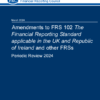
by John McCarthy Consulting Ltd. | Mar 14, 2022 | Blog, News
In several recent blogs we looked at some examples of money laundering in practical day to day business life.
Here are some more examples from the latest Consultative Committee of Accountancy Bodies (CCAB) AML Guidance released on 4 March 2022.
Some customers of your client have overpaid their invoices. The client retains overpayments and credits them to the profit and loss account. Do I need to report this as money laundering or not?
Obviously the circumstances can vary and the CCAB guidance is not to be interpreted as giving legal and definitive advice. The scenarios outlined a merely there for the purposes of illustrative guidance and for educational purposes.
The circumstances will influence whether to report this matter for money laundering purposes or not.
Report the matter if you:
- know or suspect that the client intends to dishonestly retain the overpayments. Reasons for such a belief may include:
- The client omits overpayments from statements of account.
- The client credits the profit and loss account without making any attempt to contact the overpaying party.
You may not need to report the matter if you:
- believe that the client has no dishonest intent to permanently deprive the overpaying party. Reasons for such a belief may include:
- Systems operated by the client to notify the customer of overpayments.
- Evidence that requested repayments are processed promptly.
- Evidence that the client has attempted to contact the overpaying party.
- The client has sought and is following legal advice in respect of the overpayments.
These situations are not usually clear cut and legal and professional advice may be necessary to fully understand your obligations.
We have an up to date Anti-Money Laundering Procedures Manual (September 2021) – View the Table of Contents click here.
To ensure your letters of engagement and similar templates are up to date visit our site here where immediate downloads are available in Word format. A bulk discount is available for orders of five or more items if bought together.
For our latest Audit Quality Control Manual (October 2021) (implementing the latest Irish Audit & Accounting Supervisory Authority standards including ISQC1 on audit quality control) click here. View the Table of Contents here.

by John McCarthy Consulting Ltd. | Mar 7, 2022 | Blog, News
On Friday 4 March 2022 the Consultative Committee of Accountancy Bodies in Ireland (CCAB-I) issued updated guidance applicable to accountants in practice for immediate use.
The Guidance is a widely respected and hugely valuable document among accountants as it sets out the minimum criteria that must be adhered to in order to comply with the Criminal Justice (Money Laundering and Terrorist Financing) Acts 2010 to 2021 (‘the Act’) in the Republic of Ireland.
Key changes in the legislation are reflected in additional guidance in areas such as:
- Greater emphasis on identification of beneficial owners of businesses;
- Expanding the definition of tax adviser, letting agent and intermediaries at art auctions;
- The definition of a Politically Exposed Person (PEP) to include any individual performing a prescribed function;
- There is a specific list of enhanced due diligence measures that the designated person is required to apply when dealing with a customer established, or residing, in a High-risk third country;
- The new requirement in place since 23 April 2021 that prior to commencing a business relationship is established, reasonable steps must be taken to verify the beneficial ownership of corporate clients including confirming the beneficial ownership with the relevant Central Register. Where a Designated person identifies a ‘discrepancy’ (as defined) in the Act, i.e. where the entry is inconsistent or incorrect between its own records and those maintained by the Central Register, it must notify the relevant Registrar.
- There is a similar requirement to notify the relevant Registrar where there is evidence of ‘non-compliance’ (as defined) in the Act, i.e. where the register is blank, it must notify the relevant Registrar.
A copy of the guidance may be accessed here.
Specially tailored up to date AML Training that meets the requirements of the legislation is available on request, on Zoom, in person or as a hybrid event, with a free video recording supplied afterwards, for future viewing. Contact john@jmcc.ie for further details.
To ensure your letters of engagement and similar templates are up to date visit our site here where immediate downloads are available in Word format. A bulk discount is available for orders of five or more items if bought together.
For our latest Audit Quality Control Manual (October 2021) (implementing the latest Irish Audit & Accounting Supervisory Authority standards including ISQC1 on audit quality control) click here. View the Table of Contents here.
We also have an up to date Anti-Money Laundering Procedures Manual (September 2021) – View the Table of Contents click here.

by John McCarthy Consulting Ltd. | Feb 21, 2022 | Blog, News
Have you checked what companies are registered at your office address, lately? Well, maybe now is a good time!
Police sometimes describe the practice by which drug dealers take over someone’s home (often a vulnerable person) as a base for their activities as ‘cuckooing’. It now appears that this phenomenon has ‘come home to roost’ in some accountancy firms – at least in the UK.
According to a 2021 report in the SARS in Action magazine of the National Crimes Agency the new style of cuckoo uses an accountancy firm’s address as a registered office address without the knowledge or consent of the firm.
The most likely explanation for using the accountancy firm’s address is that it provides credibility which may be used to facilitate fraud. In many cases, the company will combine using the address with a Post Office redirection arrangement so the accountancy firm will not receive any mail which might trigger an investigation.
And it gets worse. Sean Kavanagh from leading company formation agency, Company Formations International in Ballsbridge explains that it is impossible to have a fraudulent Registered Office removed from your address as the CRO do not have any legislative basis for doing so, and therefore don’t.
CRO personnel went before the Oireachtas Committee for Enterprise, Trade and Employment to discuss this and other anomalies including full blown identity theft in December 2021. We still await some positive developments from this meeting.
You have been warned!
To ensure your letters of engagement and similar templates are up to date visit our site here where immediate downloads are available in Word format. A bulk discount is available for orders of five or more items if bought together.
For our latest Audit Quality Control Manual (October 2021) (implementing the latest Irish Audit & Accounting Supervisory Authority standards including ISQC1 on audit quality control) click here. View the Table of Contents here.
We also have an up to date Anti-Money Laundering Procedures Manual (September 2021) – View the Table of Contents click here.

by John McCarthy Consulting Ltd. | Feb 21, 2022 | Blog, News
There is currently no specific modern legislation dealing with co-operatives in Ireland. The Industrial and Provident Societies (IPS) Acts 1893-2021 come from another century and do not mirror up to date company law principles. Currently there are 960 Industrial and Provident Societies registered, comprised mainly of various agricultural co-operatives, group water schemes and housing co-operatives.
There are many aspects of good practice set out in company law (in the Companies Act, 2014) that are applicable to co-operatives, either directly or with adaptation.
Consequently the Department of Enterprise, Trade & Employment commenced a consultation on 28 January 2022 on proposals to update the IPS legislation.
Amongst the proposals, it is intended that:
- The legislation will cross apply six parts of CA 2014, with amendments needed to adapt to the particular circumstances of co-operatives, relating to:
-
-
- Examinership and
- Winding up (both of these are already cross-applied in the current IPS Acts);
- Investigations;
- Compliance and Enforcement,
- Receivers and
- Financial Statements.
- The legislation will generally replicate, with some amendments, provisions from other Parts of the Companies Act, 2014 i.e.
-
-
- Directors’ Duties;
- Charges and Debentures and
- Functions of the Registrar.
- The legislation will also use the relevant parts of Companies Act, 2014 to give assurance to stakeholders in areas dealing with
-
-
- Registration;
- Corporate Governance
- Mergers and
- Strike-off and Restoration.
There are just 12 questions in this consultation and the response deadline is 5pm this Friday 25 February 2022 and responses must be sent to coopconsultation@enterprise.gov.ie.
The full consultation (and response template) is available here.
To ensure your letters of engagement and similar templates are up to date visit our site here where immediate downloads are available in Word format. A bulk discount is available for orders of five or more items if bought together.
For our latest Audit Quality Control Manual (October 2021) (implementing the latest Irish Audit & Accounting Supervisory Authority standards including ISQC1 on audit quality control) click here. View the Table of Contents here.
We also have an up to date Anti-Money Laundering Procedures Manual (September 2021) – View the Table of Contents click here.

by John McCarthy Consulting Ltd. | Feb 8, 2022 | Blog, News
In last week’s blog we looked at the CCAB case study on incomplete records. This week we look at the potential AML problems that arise when a client doesn’t pay their payroll taxes and VAT (suitably edited for local Irish legislation).
The pandemic crisis has put strain on the cashflows of many businesses. This note considers the obligations that an accountant may have if they become aware that a business that they work for, or one for which they act, is deliberately failing to pay their taxes when due.
- Payroll taxes are deducted from the wages/salaries of employees by the employer. It is the employer’s obligation to account for these taxes to the Revenue Commissioners within the prescribed time limits. The Revenue Commissioners may be willing to agree to instalment arrangements where certain conditions are met, but these arrangements should be agreed in advance. If a business fails to pay its payroll taxes by the due date, interest is levied and there can also be penalties, depending on the circumstances.
- VAT is levied on sales to customers and collected when payment is received. VAT paid on goods and services used in the business can (in many cases) be offset in whole or in part against the tax collected from customers.
In general, late payment is a civil matter. But at what point does late payment become non-payment and when might this become a criminal matter?
If steps have been taken to disguise the true tax liability, then this is fraud and would be criminal behaviour. For example:
- some employees are not included in payroll returns;
- the amount shown on the payroll return differs from the amount actually paid to the employee; or
- VAT on sales is deliberately understated.
However, there are other cases where the business simply chooses not to pay on time.
If this is a temporary, unforeseen matter – for example, the business has overdue monies due to it and does not have the banking facilities to cover the payment, and therefore delays the payment until the debtor has paid up – this is unlikely to be criminal. In general, it is advisable to contact the Revenue Commissioners as soon as difficulty making payment is expected, to discuss the prospect of agreeing time to pay.
On the other hand, there are cases where the business is aware that it has structural cashflow issues. In these cases, it does not have the funds to pay bills as they fall due, but uses the funds withheld from salaries (or in the case of VAT, collected from customers) to fund other expenses, with no plan for payment of the tax due.
Depending on the facts, if the business subsequently becomes insolvent with tax due, it should be considered whether this is fraudulent evasion of tax. The business may be in possession of proceeds of crime, which would mean that an accountant acting for that business would have obligations to report the money laundering activity.
There are some key red flags to be alert to:
- Has there been any deliberate attempt to disguise the amount of tax due?
- Has there been a deliberate, reckless or wilful use of funds which should have been earmarked for tax payments to meet other obligations?
- Has there been non-payment of tax and continuation of the trade in circumstances which should have indicated that the business could not meet its obligations as they fall due?
Where these factors are present, you should consider whether a Suspicious Transaction Report (STR) should be made simultaneously to the Garda/Revenue Commissioners on GoAML and on the ROS AML portal.
To ensure your letters of engagement and similar templates are up to date visit our site here where immediate downloads are available in Word format. A bulk discount is available for orders of five or more items if bought together.
For our latest Audit Quality Control Manual (October 2021) (implementing the latest Irish Audit & Accounting Supervisory Authority standards including ISQC1 on audit quality control) click here. View the Table of Contents here.
We also have an up to date Anti-Money Laundering Procedures Manual (September 2021) – View the Table of Contents click here.

by John McCarthy Consulting Ltd. | Feb 7, 2022 | Blog, News
In last week’s blog we looked at the fraud of Missing Trader and AML. This week the case study from the CCAB is about incomplete records.
Evans, Saffer Clarke LLP (ESC LLP) is a firm of Chartered Accountants based in a suburb of London. It acts for a number of local businesses and individuals. Its main services relate to accounts preparation, tax compliance (including VAT) and advice. It also acts as a trust and company service provider (TCSP).
ESC LLP acts for PMC Beauty Limited (“PMC”) which runs two hair and beauty salons locally. ESC LLP has carried out due diligence on PMC and has identified the beneficial owner (Martin Crean) who, until recently ran the business with his wife. ESC LLP has copies of his passport and utility bill.
Pamela, Mrs Crean, died recently and Martin has ceded day to day control to Victor, who came into the business as a temporary financial controller whilst Pamela (who previously kept the records) was ill.
During Pamela’s illness, Martin Crean asked Sandra Clarke (a partner in ESC LLP) to join the board as a non-executive director. Sandra agreed as a favour and because PMC is one of her largest clients but does not really have the time to devote to the role and so does not always attend meetings and is not as well informed about activities of the company as she would like.
Since Victor took over, ESC LLP have noticed that the records have not been kept as immaculately as in Pamela’s days. There seems to be confusion as to what has been bought or sold by which shop and there is cash being banked which doesn’t match the till records. Sandra raised her concerns with Victor, who became irritated, saying that “he wasn’t an accountant and that was why she was on the board. If she didn’t think she had enough information to draw up the accounts he would go to another firm.”
Sandra drew up the accounts and based on handwritten receipts provided by Victor and the new shop manager in one of the branches, recorded income from the shops corresponding to the bank deposits and as expenses, sundry payments to the cash and carry for supplies (based on credit card records).
The position remained the same over the next year. Three months after the account’s preparation was completed and the tax returns filed, Sandra received a visit from the police. They had been investigating PMC for money laundering and required access to Sandra’s records.
Sandra was interviewed under caution in respect of suspicions of false accounting and money laundering.
Questions
What were the red flags Sandra could have picked up?
- The first red flag was the fact that the underlying records did not match the information provided, particularly in relation to cash transactions. If the business had not changed substantially then there should have been no reason for the difference.
- There was a clear suggestion from Victor that if Sandra was unwilling to prepare the accounts then the business would be taken elsewhere. This indicated that Victor did not want the records to be examined in too much detail.
- Sandra should also have been suspicious that certain handwritten records were being provided by Victor and a new manager when previously this may not have been the case and queried why there had been a change in procedure.
What actions should have been taken?
- Sandra should have taken time to visit the premises and speak to both Victor and the new manager to establish the extent of their experience working in beauty salons. She should have tried to ascertain whether cash receipts had increased since Victor took over, and if so, why this was the case.
- Sandra should have arranged for the system of recording income to be balanced every day to reconcile with bank lodgement or credit card receipts. Despite the circumstances she could have discussed this with the previous owner to find out what information he had about Victor and his knowledge of beauty salons.
- As a Board member of PMC Ltd Sandra had the right to instruct the manner in which the records were kept. She should have been aware of her responsibilities in relation to maintaining financial records and the way the company carried out its business. As a Board member of PMC, Sandra would have been conflicted if an audit was required but could have prepared the financial statements. If an Accountant’s Report was required then this would need to have been carried out by another firm.
How should matters have been handled differently?
- Sandra should have been firmer with Victor, despite his suggestion that if she was difficult he would take the business elsewhere. She was a Board member and Victor as the Financial Controller had no authority to make decisions of this nature.
It can be assumed that Sandra would have had support from the other shareholder.
- Sandra could also have arranged for one of her employees to attend the salons on a regular basis to carry out spot checks. This would have sent a message to Victor that his work was being scrutinised from time to time.
- As a last resort she could have dismissed Victor and advertised for a new Financial Controller. It appears that she became too concerned about losing the client and allowed the situation to continue, which led to the subsequent police actions.
Next week we will look at a case study about the non-payment of tax and how that can give rise to criminal proceeds.
To ensure your letters of engagement and similar templates are up to date visit our site here where immediate downloads are available in Word format. A bulk discount is available for orders of five or more items if bought together.
For our latest Audit Quality Control Manual (October 2021) (implementing the latest Irish Audit & Accounting Supervisory Authority standards including ISQC1 on audit quality control) click here. View the Table of Contents here.
We also have an up to date Anti-Money Laundering Procedures Manual (September 2021) – View the Table of Contents click here.











